As businesses move more of their processes online, it has become harder than ever to be sure about customers’ identities. Having a reliable and robust Know Your Customer (KYC) process for businesses across various sectors is not just about compliance but also about fraud prevention and customer protection. However, traditional identity verification methods have proven cumbersome, open to fraud, and inefficient. Could digital ID offer a solution?
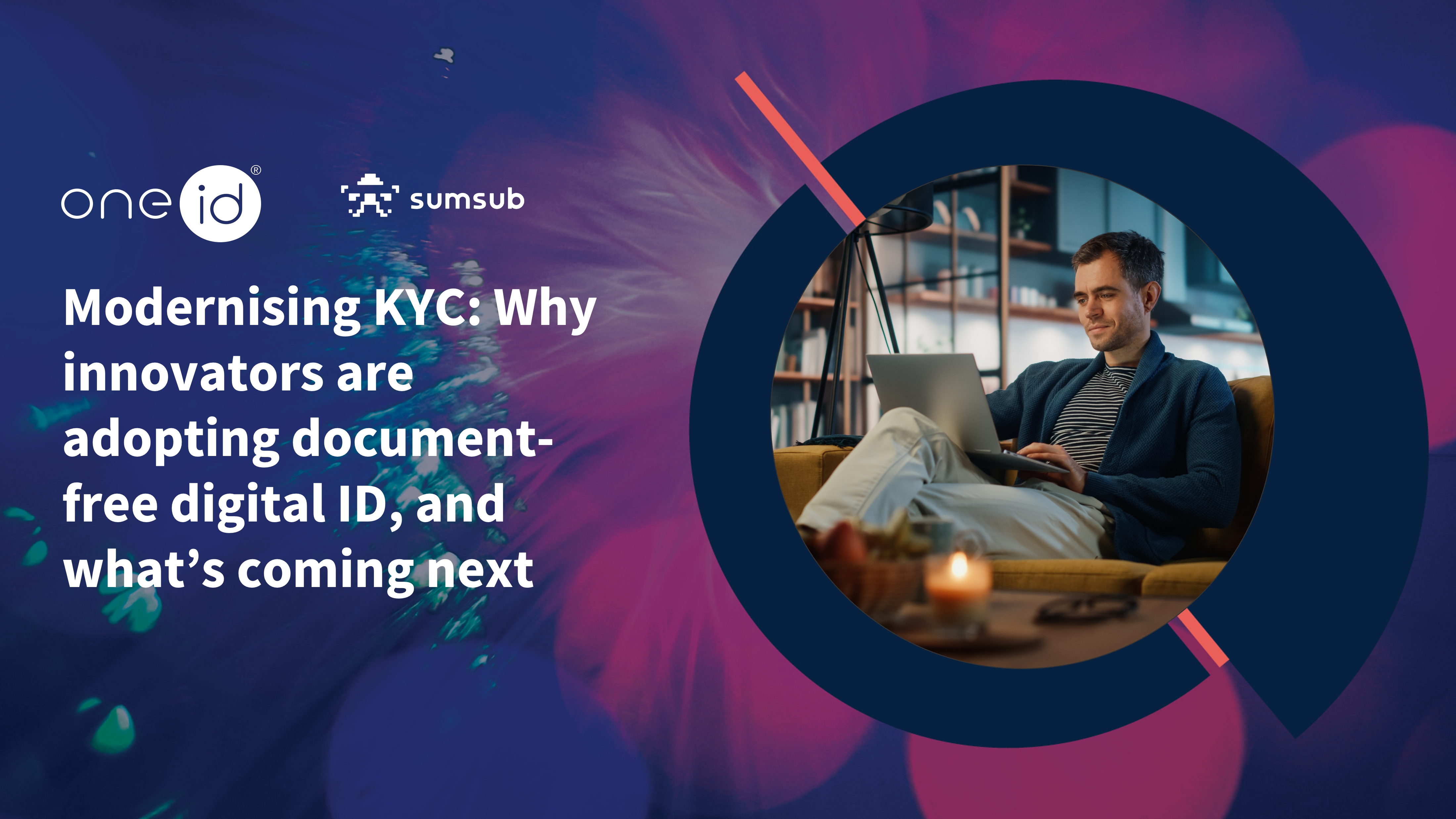 In our webinar, 'Modernising KYC: Why Innovators are Adopting Digital ID and What’s Coming Next,' I spoke with digital identity, regulatory, and KYC experts. During our conversation, we deep-dived into the transformative potential of document-free digital identity verification (IDV) for KYC and what lies ahead.
In our webinar, 'Modernising KYC: Why Innovators are Adopting Digital ID and What’s Coming Next,' I spoke with digital identity, regulatory, and KYC experts. During our conversation, we deep-dived into the transformative potential of document-free digital identity verification (IDV) for KYC and what lies ahead.
Here are my key takeaways from the webinar.
To explain the validity of document-free digital IDV, Ewan Willars, Director of Upstream Insight, shared the five steps during an identity verification process.
The widespread use of AI and digital technology to create synthetic IDs threatens businesses' existing fraud prevention and compliance strategies, presenting an urgent need to transition to document-free digital IDV.
'By leveraging alternative sources of information, such as bank-held data and independent identity registries, businesses can streamline the verification process and mitigate the risks of traditional methods that are susceptible to fraud.'
Ewan Willars, Director, Upstream Insight
Ewan explained that the biggest advantage of document-free IDV is the hybrid of security and convenience for businesses and customers. By utilising advanced technologies such as biometric data and electronic checks, businesses can ensure a higher level of protection while offering a seamless onboarding experience to their customers.
Moreover, digital IDV eliminates the need for cumbersome paperwork and physical document scans, making the process faster and more convenient for users. This is particularly important in today's fast-paced digital world, where customers expect frictionless business interactions.
Keith Mabbitt, Chief Customer Officer at OneID®, drew from his interactions with businesses and said, ‘Businesses looking to transform their processes are keeping the user at the centre. They must balance strong security with customer experience and speed.'
According to Keith, The challenges that businesses face when relying on traditional forms of ID for their KYC are:
A document-free digital identity verification, like OneID®, can deliver a slicker, faster, and more cost-effective solution and address these challenges.
A big part of the problem are the myths and misconceptions associated with electronic ID (eID) or digital ID.
Myth 1 - Digital IDV is not compliant
KYC and IDV sit within the compliance function and are highly regulated. Traditionally, innovation gets minimal traction in a regulated environment. However, Money Laundering Regulations (MLRs) state that eID checks are acceptable forms of verification within the CDD process. OneID® is a certified digital identity provider, assuring KYC platforms that they can trust OneID® to verify the identity of individuals to a Good Practice Guidance 45 (GPG45) high level of confidence.
Read about OneID’s compliance and the CDD process.
Myth 2 - Digital IDV solutions are not suitable for all cases.
The guidance about what is and what’s not possible regarding relying purely on digital ID verification has not been explicit. HM Treasury asked whether better guidance around digital ID needs to be written — and the answer is yes. The government is committed to actively encouraging and realising the benefits of document-free digital ID.
Myth 3- Digital IDV solutions are expensive.
It's easy to think that digital IDV solutions are expensive and require significant financial resources and technological infrastructure. However, solutions like OneID® leverage open banking infrastructure, making them cost-effective and easy to integrate into existing systems. In fact, OneID® is cheaper than traditional IDV solutions.
Myth 4 - Less secure and potential for data abuse
Ewan pointed out that the digital identity ecosystem is evolving rapidly, with standards being codified and providers being certified against various levels of security. Failure rates and fraud significantly decrease when digital IDV is implemented effectively.
‘When you trust your bank with your money, why not with your identity details?’
Keith Mabbitt, Chief Customer Officer, OneID®
Keith makes a hard-to-counter statement in support of bank-verified digital identity verification, which OneID® uses. Banks have already conducted stringent checks on their customers, have strong customer authentication processes, and actively analyse customer behaviour. All these factors enhance the reliability of bank-verified digital identity.
All this is wrapped up in the OneID® API, which uses open banking infrastructure and delivers a simple journey. OneID® is compliant with the Joint Money Laundering Steering Group (JMLSG) guidelines and certified by the UK government’s Department of Science, Innovation, and Technology.
Vainius Fedotovas, Head of Data Intelligence at Sumsub, showcased how OneID® is helping them speed up the KYC process for their UK clients across regulated and non-regulated industries and deliver a truly digital onboarding experience. Vainius says the solution's ease and versatility extend its applicability beyond KYC to age verification, onboarding, address verification, and more.
Sumsub highlighted the future of non-doc verification, which combines pre-verified user data with biometric authentication methods. This approach has accelerated onboarding six times and increased pass rates by 35%. This is primarily because of the friction-free and documentless digital IDV that OneID® presents. An easier journey is more likely to be completed. An end-to-end digital process reduces the number of errors, false captures or fraudulent documents. More importantly, with OneID®’s document-free approach, Sumsub can reach 95% of the UK’s population.
'Non-doc digital ID verification will see wider adoption in other parts of the world.'
Vainius Fedotovas, Head of Data Intelligence at Sumsub
Ewan and Keith agreed with Vainius that more countries would adopt document-free digital IDs for KYC purposes. Keith believes the UK will emulate the example of other European countries – especially the Nordics, where BankID has a 99.4% adoption rate (Sweden).
Ewan is excited about the Data Protection and Digital Information Bill, which has bipartisan support in the UK parliament and is expected to gain royal assent soon. A trust mark is also being developed to show people that an online profile has been verified under the Digital Identity and Attributes Trust Framework (DIATF).
Keith also believed that document-free digital IDV solutions like OneID® would give individuals the power and flexibility of reusable IDs. For individuals who use social media log-ins because of their ease of use and ubiquity, a UK Government-certified reusable ID would provide the same ease of use but put them in much greater control of where and how they share their identity data without sacrificing privacy.
As businesses navigate the complexities of compliance and user experience, embracing innovative solutions like OneID® and all-in-one verification platforms like Sumsub will pave the way for efficient, secure, and inclusive identity verification processes in the digital age.
We received many questions during the webinar—enough to warrant a separate webinar. Instead, I'm going to sit down with our experts to answer all the questions in part two of the blog. Stay tuned.
If you missed the webinar or want to watch it again, you can click here.
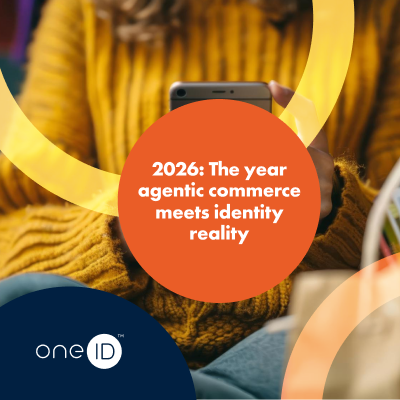
Agentic commerce is already operating inside live retail, payments, and platform environments. For Partn...
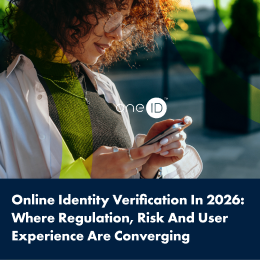
Online identity verification entered a new phase in 2025. Across adult platforms, gambling, financial se...
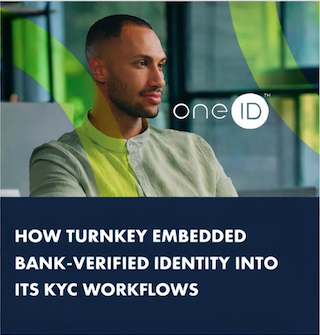
Last month, we joined Turnkey for an industry event to talk about a challenge many regulated platforms a...
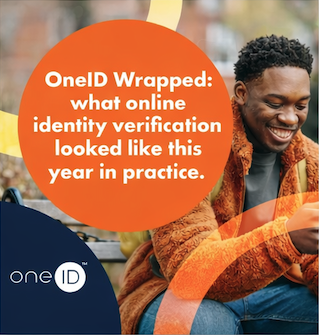
2025 has been a year of continued growth and real-world proof for OneID®. As expectations for identity a...